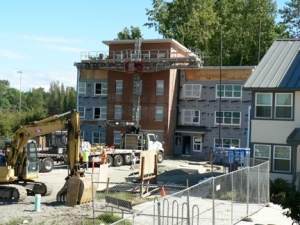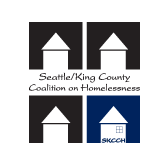You could tell he was different the moment he walked in the coffee shop. It wasn’t his appearance. He looked presentable, if a little rough around the edges, clutching an old BlackBerry to his barrel chest. It was how he moved: warily, shoulders hunched over and eyes darting. The body language would read as suspicious, if not for the flicker of fear and apprehension in his eyes – as if he was scared of being noticed, vigilant to his surroundings and desperately trying to blend in at the same time.
He ordered a coffee, carefully counting out coins on the counter. He sat down at the table near me and pulled out his phone, just like nearly everyone else at the shop. He punched in a few numbers and began talking in a low voice, discreet but urgent. I was only a few seats away, but I couldn’t help but overhear his conversations.
Did someone have some cash jobs for him? Could he crash at a friend of a friend’s place? Could he get a ride out to the soup kitchen? After a few calls, it became clear: he was homeless. A homeless man with a smartphone.
Bert isn’t unsheltered. He bounces between emergency shelters and friends’ couches while he seeks temporary, cash-based day-laborer work. He refuses, in fact, to call himself homeless. “This is just a temporary condition,” he tells me more than once, after we struck up a conversation. Over and over again, he said he would get himself out of “this tight spot,” though he was vague about how long he’d been in it and how he got there. He made it clear: he hadn’t given up.
It wasn’t easy to engage him in conversation. When I first asked how he liked his BlackBerry, he looked at me like I was crazy. Later, he chalked up his guarded nature to the fact that he often doesn’t have casual conversations anymore. Most people, he said, tend to avoid him once they realize he is poor and transient. “You can’t hide it, being poor,” he said.
He made a joke about people acting as if poverty was an infectious disease. They give him a wide berth and pretend he’s not there. “I can go whole days without people not even looking at me,” he said. “And when they do, it often means they’re sizing you up, wondering if they need to kick you out or something.” The result, he said, is a sense of exile, from any feeling of belonging you have to the human race.
His phone, then, functions as an important conduit. On the surface, it’s his most important, practical tool. He can call places for work with it. He can call up shelters and other social services to see what’s available. He calls public transportation to find out which bus lines are running and check out schedules.
E-mail and text is especially important. He can reach out to friends to see if he can crash with them for a night or two, especially if the weather is rough. But he has to be careful. “You don’t want to impose,” he said. “You can’t exhaust your friends. Otherwise they’ll get tired of helping you, thinking, ‘Why are you still struggling?'” The hidden worry is that you’ll never leave.
Ironically, all this is easier to manage over text and e-mail than the phone. “You don’t have to worry about sounding upbeat and confident all the time,” he said. No one wants to help out the hopeless, and sometimes it’s not really so easy to disguise the worry and anxiety from your voice.
Slippery Slopes
Despite nearly everyone owning a cell phone, we think of them as luxuries, especially as data plans approach $100 a month. The idea of a homeless man with an iPhone, but no job or roof over his head, is discomfiting, mostly because poverty is perhaps one of the last bastions of unexamined prejudice in the U.S. Few would argue that people of different races or genders shouldn’t own phones, but it’s still common to temper sympathy for the homeless or destitute if they have a phone.
Even the most progressive areas of the country can show a certain callousness to what poverty should look and feel like. In San Francisco, for example, city supervisor Malia Cohen sparked controversy when she posted a picture of a homeless man on Facebook, talking on a phone while huddled underneath a freeway overpass. “This kind of made me laugh,” she commented, which led to an uproar and eventual removal of the picture. Ironically, California last month decided to expand their Lifeline program to give free phones and service to the homeless, recognizing the value of the devices for the disadvantaged.
The reality is homelessness is a simple term for a complex sociological condition, affected by a mosaic of factors that interact and affect one another in often unexpected ways. Large-scale trends like unemployment combust with local factors, such as lack of affordable housing or services easily accessible and open to those in need. Add in volatile personal situations – like addiction, family violence, financial instability or simply being far from family – you have a slippery slope to stand upon.
The homeless themselves range from the “unsheltered” living on the streets to doubled-up families living in single-occupancy homes. That includes those in transitory housing or emergency shelters, as well as the famous 2004 case of a student at NYU who attended school while sleeping at the library and showering at the gym.
About 20 out of every 10,000 people are homeless, according to the National Alliance to End Homelessness. Anyone without enough personal or social capital can get caught in the cycle, and it’s not easy to pull out, when you consider the tremendous shame and judgment they experience within themselves and from the world at large. But there’s one effective tool that can help. Yes, phones.
Keeping Up Appearances
On another level, Bert said his phone connects him to less tangible, but still important, resources. He knows people can reach him, no matter where he sleeps at night. He gets daily e-mails from an online ministry, with inspirational messages and passages from the Bible. Those keep up his spirit and faith and keep him going. He can read news on the browser, too. Ironically, his biggest criticism of BlackBerry is the browser: it’s slow and outdated and most websites won’t load on it anymore. He only gets a certain amount of time on the computer at the public library, so he often begins researching jobs and housing on his phone and makes a list of websites he wants to visit when he gets on a computer with a faster connection.
The phone also, in part, structures his day in an often chaotic life. He has an exhaustive list of places to charge his phone, and he makes sure to hit them at some point during the day. He’s careful about his power and data usage and carries his charger at all times, in one of the capacious pockets of his army jacket. “When I see a free outlet somewhere, I have to say, it feels like Christmas,” he said. Free Wi-Fi inspires the same feeling; he can save up his valuable data usage.
But the most valuable aspect about his phone, is simply that it makes him look like everyone else. “You won’t believe it,” he tells me, “but if I didn’t have my phone, I probably couldn’t just sit here and have my coffee and be talking to you. It gives me something I can do in public. It’s not loitering if I’m typing or talking on my phone.” Loitering, he said, is often a good excuse to kick the homeless out of a place. And a phone is a passport that lets him stay in places longer than he would otherwise.
“You have to realize about my situation, most people don’t look beyond appearances,” he said. And if there’s one thing that matters when you’re homeless, according to Bert, it’s appearances. The minute the facade cracks and reveals his struggle, no one wants to be around you. No one wants to see it. People kick you out of places; they can tell you don’t belong anywhere.
In talking with Bert about not just phones, but his life in general, I realized he’s someone with a clear-eyed inventory of his scant resources. And he maximizes them with an eye to maintain appearances. Within that ruthless calculus, a phone was more important than his car, which he sold after the winter and didn’t need to sleep in as a last resort. And besides, he said, cops are on the lookout for people sleeping in cars – it’s not as practical as you think.
He used the car money to save for his phone bill, as well as a cheap $30-a-month membership to a local 24-hour gym in a central part of town, which gives him regular access to a hot shower and a place he can go late at night if he needs. He knows that sounds ludicrous, but says nothing marks a homeless man more than pungent body odor and an unclean appearance.
You could have all the iPhones in the world with you, he said, but if you don’t have a regular way to stay clean, that’s the most dangerous thing of all in a precarious situation. Nothing gets a homeless person kicked out faster, rejected from a job instantly or denied housing than looking dirty. He kept repeating, “Dirty ain’t dignified.” It’s often that dignity that Bert fights so hard to maintain, even at the expense of other things – but definitely not at the cost of a cell phone.
Through the Cracks
Bert’s ability to stay afloat and even keep up his personal dignity sheds light not only on how central phones are to our lives – no matter how poor you are – but also the world’s poverty of generosity and compassion. For every great example of helping others – such as the Reddit user who found a Chicago homeless man and delivered a care package to him – there are countless others who slip through the cracks, who walk in through doors of public places, face stares of cold evaluation and wonder if they’ll be kicked out.
Bert lives assuming that people’s generosity and compassion are limited to a certain point – and once you push past that point, you’re lost beyond all help. Despite his situation, he’s a proud man, but burdened with the “double consciousness” that marginalized people often have – able to see himself both through his eyes, and through the eyes of how others would judge him. And it was clear that the discrepancy between the two distressed him, and much of his survival strategy tried to bridge that gap.
I saw Bert only a few times after our first conversation, though we never did talk as in-depth. Sometimes he let me buy him a coffee refill, though he wanted to buy the first cup himself. But after a few months, I didn’t see Bert anymore, and I’m not really sure what happened to him.
Did he finally pull himself out of his “temporary condition,” as he called it? Or was he like countless others who slipped through the cracks into the shadowy netherworld of genuine destitution and poverty, becoming one of the “unsheltered”? I just don’t know. He may still have his own phone number, but he remains out of reach, lost somewhere in a world where social ties are tenuous connections, no matter how many devices we have.




































